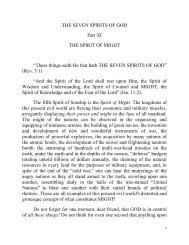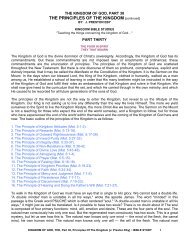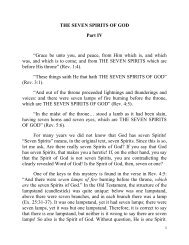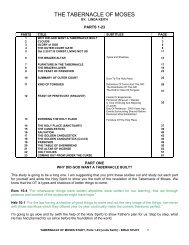Song of the Bride, Parts 1-34 - Feasting at the King's Table
Song of the Bride, Parts 1-34 - Feasting at the King's Table
Song of the Bride, Parts 1-34 - Feasting at the King's Table
Create successful ePaper yourself
Turn your PDF publications into a flip-book with our unique Google optimized e-Paper software.
Lord was upon <strong>the</strong> earth, and is still going forth by <strong>the</strong> Spirit. Jesus would have us sing as He prunes in our<br />
vineyard, stripping us th<strong>at</strong> we might bear much fruit.<br />
I am very much aware th<strong>at</strong> <strong>the</strong> winter has past away for many and <strong>the</strong>y are entering into a blessed time <strong>of</strong><br />
fruitfulness. I wish you could read our mail! It used to be th<strong>at</strong> people would ask, “Wh<strong>at</strong> is <strong>the</strong> Lord saying to<br />
you?” but now <strong>the</strong>y are sharing wh<strong>at</strong> <strong>the</strong> Lord is saying to <strong>the</strong>m! Years ago we had few contributions to share<br />
from <strong>the</strong> Body whereas now we have many more than we can use. Surely, <strong>the</strong> voice <strong>of</strong> <strong>the</strong> turtledove is being<br />
heard in our land!<br />
PART SIX<br />
Newsletter No. 179 – December 2001<br />
<strong>Song</strong> <strong>of</strong> Solomon 2:13, “The fig tree ripeneth her green figs, and <strong>the</strong> vines are in blossom; <strong>the</strong>y give forth<br />
<strong>the</strong>ir fragrance. Arise, my love, My fair one, and come away.”<br />
Mount Olivet was famous for its fig trees in ancient times, and <strong>the</strong>y are still found <strong>the</strong>re. To “sit under one’s<br />
own vine and one’s own fig tree” became an expression among <strong>the</strong> Jews to denote peace and prosperity. The<br />
fruit always appears before <strong>the</strong> leaves; so th<strong>at</strong> when Christ saw leaves on <strong>the</strong> fig tree by <strong>the</strong> wayside (Mark<br />
11:13), He had a right to expect fruit. The fruitage <strong>of</strong> <strong>the</strong> fig tree has been preparing during <strong>the</strong> winter and <strong>the</strong><br />
young green figs “make red” in May or June when o<strong>the</strong>r fruit trees are just beginning to blossom. But, in <strong>the</strong><br />
sunny ravines <strong>of</strong> Olivet, fig trees could have ripe fruit some weeks earlier. It was near <strong>the</strong> time <strong>of</strong> Christ’s<br />
passion when He looked to find fruit on <strong>the</strong> fig tree and found none. It was not strange to find young e<strong>at</strong>able<br />
figs ready <strong>at</strong> th<strong>at</strong> time.<br />
Would it have been just <strong>of</strong> Jesus to have cursed <strong>the</strong> fig tree if it was not capable <strong>of</strong> bearing fruit <strong>at</strong> th<strong>at</strong> time?<br />
Let us look a little deeper. The Lord was performing a prophetic act here. The fig tree always speaks <strong>of</strong> <strong>the</strong><br />
Jews. He had sent His prophets to speak to <strong>the</strong>m and now <strong>the</strong> Son had come, yet those who had killed <strong>the</strong><br />
prophets, despised <strong>the</strong> Son also. Jesus said: “No man e<strong>at</strong> fruit <strong>of</strong> <strong>the</strong>e hereafter forever.” His words<br />
prophesied th<strong>at</strong> <strong>the</strong> Jews would produce no fruit for “<strong>the</strong> age” (<strong>the</strong> correct rendering <strong>of</strong> ‘forever”). We have<br />
certainly seen this prophecy come to pass, for in this whole Age, <strong>the</strong> Jews have been an unfruitful tree and<br />
have brought forth only leaves to cover <strong>the</strong>ir nakedness. They have not received <strong>of</strong> <strong>the</strong> divine life th<strong>at</strong> Jesus<br />
brought—which is <strong>the</strong> only way in which anyone can be fruitful!<br />
His “chosen people” had walked through a long time <strong>of</strong> winter—<strong>of</strong> trying to keep <strong>the</strong> Law and finding in<br />
<strong>the</strong>mselves no ability to do so! And, if <strong>the</strong>y broke one law, it was counted as if <strong>the</strong>y had broken <strong>the</strong>m all! They<br />
were vainly trying to keep those precepts th<strong>at</strong> reveal God’s perfectness, when <strong>the</strong>y were meant only to reveal<br />
<strong>the</strong>ir need <strong>of</strong> a Saviour, One who could change <strong>the</strong>ir n<strong>at</strong>ure so th<strong>at</strong> <strong>the</strong>y could walk righteously before <strong>the</strong>ir<br />
God. The Law made <strong>the</strong>m know wh<strong>at</strong> sin was in God’s eyes but it could never make <strong>the</strong>m perfect.<br />
So, <strong>the</strong> Son came, looking for ripening fruit from this people unto whom He had chosen to reveal Himself th<strong>at</strong><br />
<strong>the</strong>y might show His n<strong>at</strong>ure unto <strong>the</strong> o<strong>the</strong>r n<strong>at</strong>ions. He found “<strong>the</strong> vines in blossom”. The Jews had a “look <strong>of</strong><br />
beauty” upon <strong>the</strong>m. They had <strong>the</strong> majesty and richness <strong>of</strong> <strong>the</strong> ceremonies <strong>of</strong> <strong>the</strong> temple, and <strong>the</strong> temple itself<br />
showed a “promise” <strong>of</strong> fruitfulness. Yet, when <strong>the</strong> blossoms would fall, <strong>the</strong>re would be no fruit to nourish and<br />
streng<strong>the</strong>n.<br />
I recall a friend who was being drawn by <strong>the</strong> Spirit to leave her dead, dry church and walk with Him in <strong>the</strong><br />
Spirit. She wanted to obey <strong>the</strong> Lord in this, but she told me plaintively, “But I’ll miss th<strong>at</strong> beautiful pipe organ. It<br />
has such a majestic tone! I don’t know how I can worship without it!” She saw <strong>the</strong> blossoms but didn’t realize<br />
th<strong>at</strong> <strong>the</strong> Lord wanted to prune her so th<strong>at</strong> she could bear more fruit and not just look for “a good show in <strong>the</strong><br />
flesh.”<br />
There must be <strong>the</strong> blossoms and <strong>the</strong> flowers before <strong>the</strong> fruit appears. If <strong>the</strong> pure, fragrant life <strong>of</strong> our Lord upon<br />
earth were all, <strong>the</strong>n <strong>the</strong>re would be no fruit; and His life would have pr<strong>of</strong>ited nothing in <strong>the</strong> redemption <strong>of</strong> <strong>the</strong><br />
human race. But, our Lord’s life was perfected, <strong>the</strong> fruit was perfected and was ga<strong>the</strong>red, and <strong>the</strong> juice <strong>of</strong> <strong>the</strong><br />
fruit flowed out when He hung upon Calvary. It was only as He died th<strong>at</strong> fruit appeared on <strong>the</strong> true Vine. Those<br />
SONG OF THE BRIDE, <strong>Parts</strong> 1–<strong>34</strong> [Elaine Cook] ~ BIBLE STUDY 12


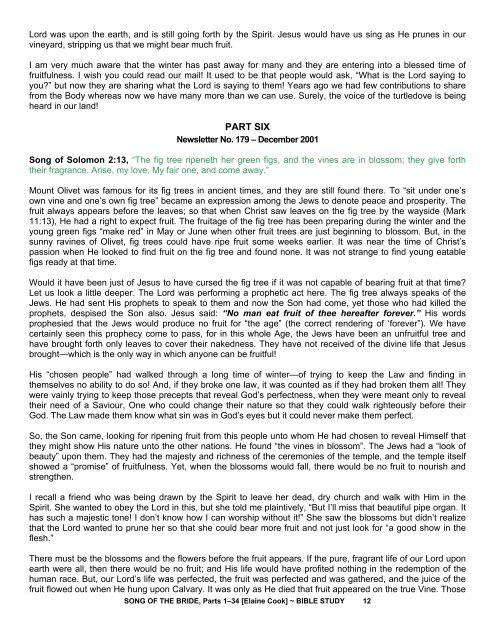
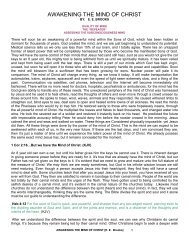
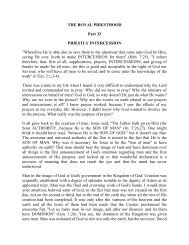
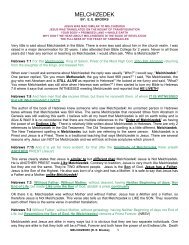
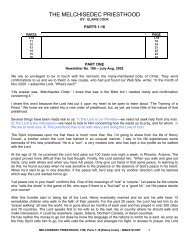
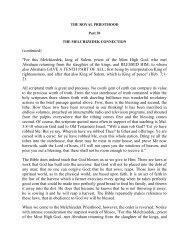
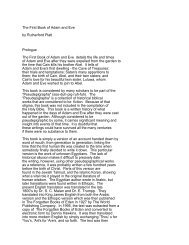
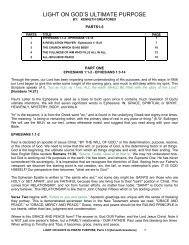
![WOOD AND STONE â THE STORY OF KING CAIN [EE Brooks]](https://img.yumpu.com/31019666/1/190x245/wood-and-stone-a-the-story-of-king-cain-ee-brooks.jpg?quality=85)
